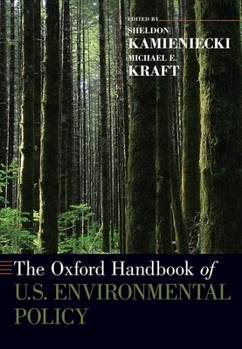The Oxford Handbook of U.S. Environmental Policy
Select Format
Select Condition 
Book Overview
Prior to the Nixon administration, environmental policy in the United States was rudimentary at best. Since then, it has evolved into one of the primary concerns of governmental policy from the federal to the local level. As scientific expertise on the environment rapidly developed, Americans became more aware of the growing environmental crisis that surrounded them. Practical solutions for mitigating various aspects of the crisis - air pollution, water pollution, chemical waste dumping, strip mining, and later global warming - became politically popular, and the government responded by gradually erecting a vast regulatory apparatus to address the issue. Today, politicians regard environmental policy as one of the most pressing issues they face. The Obama administration has identified the renewable energy sector as a key driver of economic growth, and Congress is in the process of passing a bill to reduce global warming that will be one of the most important environmental policy acts in decades. The Oxford Handbook of U.S. Environmental Policy is a state-of-the-art work on all aspects of environmental policy in America. Over the past half century, America has been the world's leading emitter of global warming gases. However, environmental policy is not simply a national issue. It is a global issue, and the explosive growth of Asian countries like China and India mean that policy will have to be coordinated at the international level. The book therefore focuses not only on the U.S., but on the increasing importance of global policies and issues on American regulatory efforts. This is a topic that will only grow in importance in the coming years, and this handbook serves as an authoritative guide to any scholar interested in the issue.
Format:Paperback
Language:English
ISBN:0190465328
ISBN13:9780190465322
Release Date:November 2015
Publisher:Oxford University Press
Length:792 Pages
Weight:2.86 lbs.
Dimensions:1.6" x 6.7" x 9.6"
Customer Reviews
0 rating





